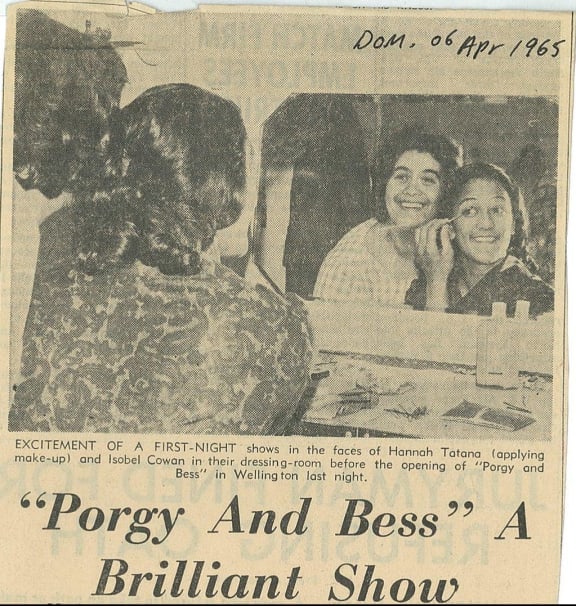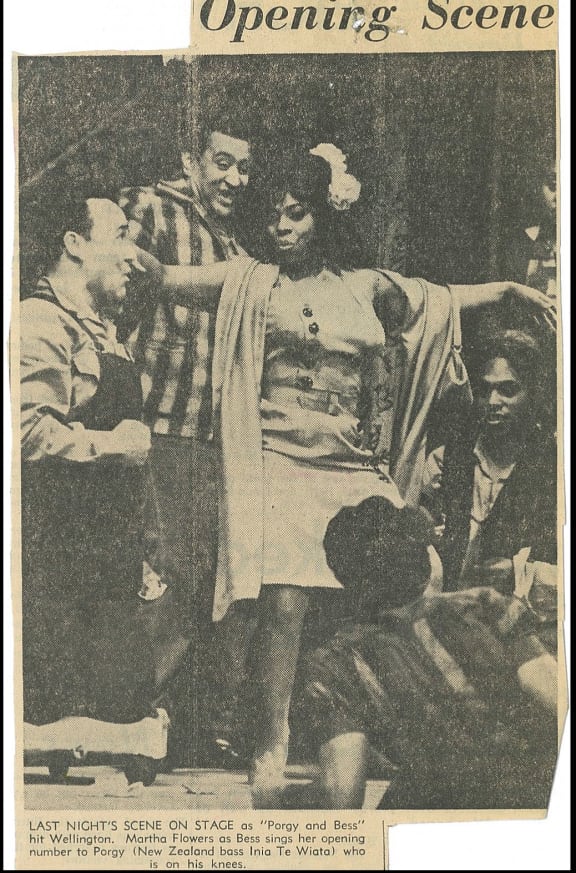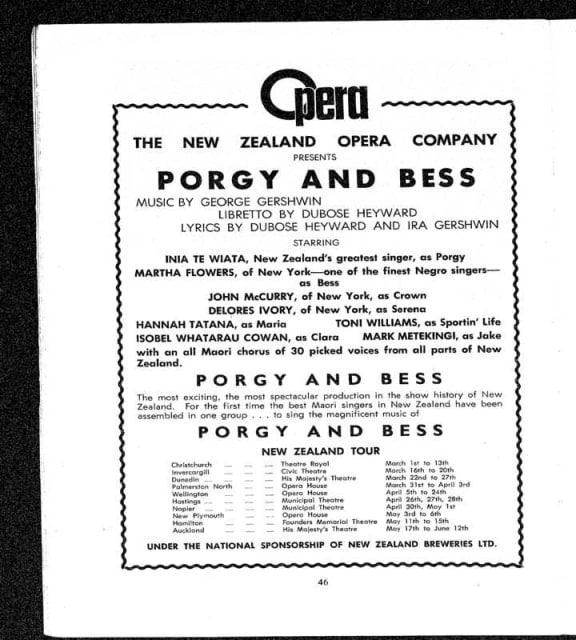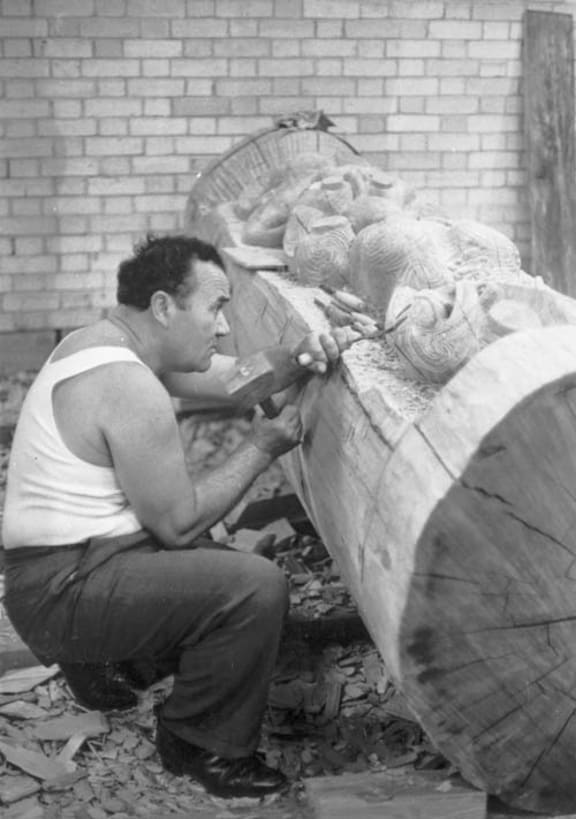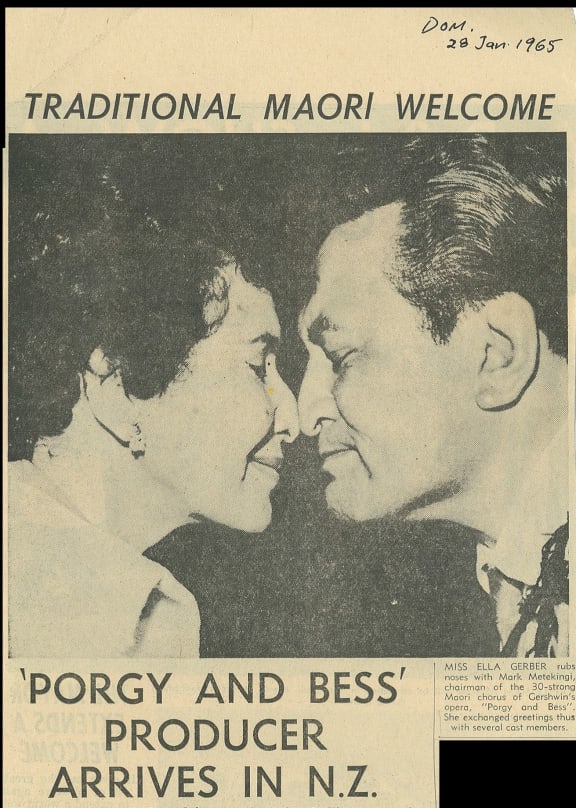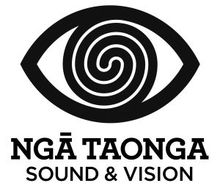 Nga Tāonga Kōrero is a house of treasures, not just the miles of ancient recording tape, but sharp archivists who notice things and think “There’s a story there”. Sarah Johnston is one of these treasures. Sarah noticed that back in 1965 the old 'Māori Programme' covered a production of George Gershwin’s opera Porgy and Bess, with a largely Māori cast. Maybe we could do something for the 50th anniversary?
Nga Tāonga Kōrero is a house of treasures, not just the miles of ancient recording tape, but sharp archivists who notice things and think “There’s a story there”. Sarah Johnston is one of these treasures. Sarah noticed that back in 1965 the old 'Māori Programme' covered a production of George Gershwin’s opera Porgy and Bess, with a largely Māori cast. Maybe we could do something for the 50th anniversary?
Now, I was just a little tacker in 1965, but even I remember that Porgy and Bess was a REALLY BIG THING, like the Miss New Zealand Pageant or the Auckland Easter Show or the Golden Shears. I remember that we had a copy of the theatre programme kicking around at home, I think my parents went on a social club bus trip to Auckland to see it. Three hours each way from Thames in those days, even without a huge tail-back at the old Kopu Bridge!
When I listened to the audio from Nga Tāonga Kōrero, it turned out to be great. In 1965, the Māori Programme was mainly presented by Wiremu Parker, and I doff my cap to the better man – he absolutely aced it. Wiremu talked to many of the people behind the production, asked all the right questions, and – almost inadvertently - made the only recordings of the cast performing.
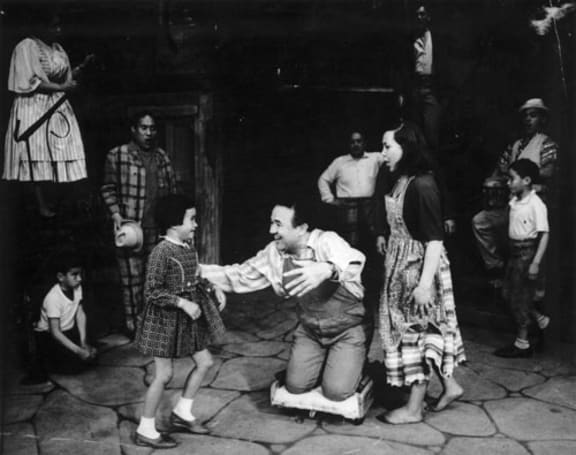
"Porgy (Inia Te Wiata) gets a warm welcome back to Catfish Row after police have taken him away for questioning. No-one is willing to tell him that his woman Bess has run off with Sportin' Life - the dope peddlar from New York". 1965 or 1966: Te Wiata, Beryl :Photographs of Inia Te Wiata (PAColl-6795). Ref: 1/2-190159-F Photo: Beryl Te Wiata/Alexander Turnbull Library
Fifty years on, there are quite a few survivors from the Porgy cast, and I thought about interviewing some of them for you; I had a lovely talk with author Apirana Taylor, who was in the show as a ten year old. But interviewing survivors would have filled a show all by itself. And that would have meant leaving most of Wiremu Parker’s original recording work on the cutting room floor. So, in the end I decided to let all these wonderful voices from the past tell the story, the way they did at the time. (Well, with a smidgeon of linking commentary from muggins here to put it in historical context...)
Part of the reason that Porgy and Bess was a big thing was that musical theatre was a big thing. Nowadays musical theatre’s still a very lucrative business. But it’s a total niche universe, like bagpipe music or reggae: no-one outside the loop gives a damn. The only way most of us know about a new Broadway show is when there’s a new logo on Nanna’s coffee mugs and sweatshirts. Most people can’t name any musicals that have opened on Broadway in the last decade, or sing any of the songs.
But fifty years ago, everyone knew a few showtunes. The Liverpool soccer anthem 'You’ll Never Walk Alone' actually started life in a Rogers and Hammerstein show. Most people with a record-player owned a few cast recordings of shows like My Fair Lady or The Sound of Music or Porgy and Bess. With fewer media outlets, people were exposed to far more varieties of music. On radio, the music mix was more like Saturday Nights on RNZ National, with all genres of music bundled up willy-nilly. Nowadays, music radio is vastly duller, and apps like Pandora let each of us live in our own personal musical ghetto.
- Steve Danby
A 50th anniversary of Porgy and Bess
Listen to Steve Danby's insight into the opera production Porgy and Bess performed by the New Zealand Opera Company in 1965.
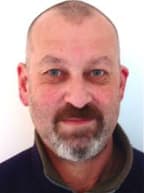
Steve Danby Photo: Steve Danby
Steve Danby grew up in Thames, and studied at Victoria University.
Since then, he's had a typical career for a minor literary figure. He edited a national gay magazine called "Pink Triangle" and served on both the Film and Literature Board of Review, and the Board of Taki Rua Theatre. He began broadcasting with Radio Active, and he's been Radio New Zealand's resident trouble-maker for about twenty-five years. Starting as a playwright for radio drama, he eventually ended up as head of the Drama Unit. He also made innumerable music documentaries for RNZ Concert.
